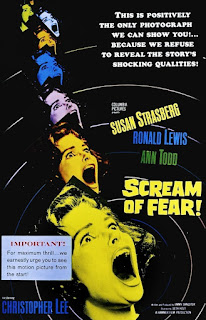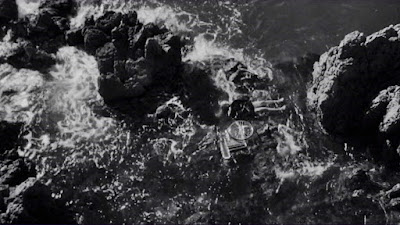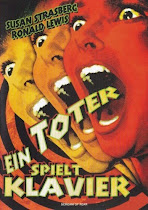... aka: Kyôfu (Fear)
... aka: La casa del terrore (The House of Terror)
... aka: Pelon tunne (A Feeling of Fear)
... aka: Taste of Fear, A
... aka: Un grito de terror (A Scream of Terror)
Directed by:
Seth Holt
Director Seth Holt started out as an actor before transitioning into editing at Ealing Studios, where he worked as an assistant (usually sans credit) on such classics as Dead of Night (1945) and, one of my personal favorites, Kind Hearts and Coronets (1948). From there, he moved on to primary editing, producing and, finally, a single shot at directing (the crime drama Nowhere to Go) at Ealing before the studio was absorbed by the BBC in the late 1950s. While Nowhere to Go was a box office flop and critical failure, it was enough to get his foot in the door with Hammer, who hired him for Scream of Fear (originally titled Taste of Fear). Instead of suffering from a sophomore slump, Scream was both a commercial and critical success in the UK, U.S. and throughout much of Europe. Despite that, he'd have a difficult time securing directing jobs until his death and was involved in a number of projects that either ultimately got assigned to other filmmakers or were abandoned altogether.
Holt is almost exclusively known these days for a trio of genre films he was able to make with Hammer, which also included the excellent The Nanny (1965) starring Bette Davis, and the lesser but still not bad Blood from the Mummy's Tomb (1971), which he was never able to finish because he died of a sudden and unexpected heart attack at the age of just 47 (producer Michael Carreras had to step in and complete the final week of shooting). What's obvious in retrospect is that he clearly should have been given far more chances to direct than he was, and Hammer in particular should have utilized him far more than what they did.
Having spent ten years away in Italy, wheelchair-bound Penny Appleby (Susan Strasberg), who was crippled in a horse-riding accident, returns to France to stay with her estranged father (Fred Johnson). Expecting him to meet her at the airport, she's surprised to instead see he's sent his chauffeur Robert (Ronald Lewis, who also starred in William Castle's MR. SARDONICUS this same year) to retrieve her. On the drive to the family villa, Robert informs Penny that her father went away four days earlier, he doesn't know where he went, doesn't know when he'll be back and that he has recently been ill but is now apparently doing better, at least well enough to travel abroad.
Upon arriving at her new home, Penny meets her stepmother Jane (Ann Todd) for the very first time and, bucking the evil stepmother stereotype, she seems friendly, affectionate, compassionate and even a bit motherly. They've transformed the father's sitting room into a bedroom for her, purchased new furnishings, put in ramps for her chair and even installed a buzzer that rings down to the kitchen and the parents' bedroom if she ever needs anything. As for the whereabouts of the father, Jane informs her that he went out out of town on a "business deal," even though she pleaded with him not to. Seeing how he's not seen her for an entire decade, it's basically impossible for Penny to not feel just a little hurt by his absence.
Penny has recently been through a lot of trauma and is in an especially vulnerable, perhaps even emotionally unstable, state. She didn't want to leave Italy, which has been her home since her parent's divorce, but felt she had no other choice after the passing of her mother and then the death of her nurse / best friend (perhaps even lover) in a mysterious drowning accident. After losing the two closest people to her, she grew depressed and suicidal, and that's when she received a letter from her father asking for her to return to France. It doesn't take her long to regret taking him up on the offer.
Her first night there, she gets up to fix a rattling shutter, sees a candlelight flickering in the summer house across the courtyard and goes to investigate. Inside, she's startled to discover what appears to be the corpse of her father. Panicking, she tries to wheel away and ends up falling into a swimming pool. She's saved by Robert and, when she awakens, she's being tended to by local physician Dr. Pierre Gerrard (Christopher Lee), who also happens to be her father's personal doctor (and his chess buddy). Robert had made mention already that Gerrard has recently been a regular presence in the home, and he appears to be plotting something with the stepmother. Determined to prove she's not a "mental defective," Penny insists they all go to where she saw the corpse, but no body is there and everyone claims the summer house is always kept locked up, anyway.
Unlike most other victimized, weepy heroines in films like this, Penny is refreshingly not about to just roll over and play the victim. While she's emotional and a bit neurotic, she's also smart, plucky, headstrong and maintains her wits. She knows what she sees isn't a delusion, senses some scheming going on behind her back and acts accordingly, approaching everyone around her with suspicion and distrust. She snoops around. She asks questions. She refuses pills from Dr. Gerrard, starts growing a bit distant from Jane and, while Robert seems like a potential ally (and a potential love interest), she has her apprehensions about him, as well. She's also careful about giving certain characters information that may conceivably be used against her, including additional sightings of her father's corpse around the house. Strasberg is one of those actresses who usually doesn't make an overwhelmingly positive nor negative impression on me, but she's pretty wonderful in this particular role.
Though Lee spoke highly of this film and the director in interviews, and said it was perhaps Hammer's best overall production, he's interestingly the weakest link of the central cast. That's due in part to his failed attempt at a French accent and in part to the fact his character simply isn't all that interesting. Thankfully, the other three stars are all great. Lewis is extremely magnetic as the chauffeur and had all that it took to become an A List leading man. Sadly, that never happened due to his alcoholism, which eventually led to bad press, troubles with the law, divorces, bankruptcy and a damaged career, culminating in his suicide in the early 80s. Often unfairly overlooked here is Todd, who gives an excellent performance; perhaps the best performance. The way she uses subtle facial expressions and body language to show cracks beneath the surface of her warm, caring exterior tells you this woman was a complete pro.
In addition to the strong direction and acting, this excels in the screenplay department too, with fine dialogue, characterizations and plotting. Just when you think you're getting a handle on what's going on and working out who's conspiring with who to get what (a sizable inheritance is naturally at stake), Jimmy Sangster's script pulls the rug out from under you and unleashes some genuine surprises in the last 20 or so minutes. These aren't surprises pulled out of thin air either, but one's carefully built into the story. This is also a handsome looking film. Multi-BAFTA winner and three time Oscar nominee Douglas Slocombe (who'd go on to work with Steven Spielberg, Roman Polanski and other notables) does a great job shooting it, using lots of low lighting, shadows and lush soft focus. Other production people, from composer Clifton Parker to production designer Bernard Robinson, offer up strong work, as well.
This film's success led Hammer to branch out from their usual period-set classic monster movies to produce more modern psychological genre films. The initial cycle of these (there would be another in the early 70s) included Maniac, Paranoiac (both 1963), Nightmare (1964), Fanatic (aka Die! Die! My Darling!), Hysteria and the aforementioned The Nanny (all 1965). Though some of these are better than others, all of them are at least decent.
Released theatrically here in the U.S. by Columbia (who also handled the British, Canadian and Mexican releases), this then turned up on home video (with rather horrible-looking box art) by RCA / Columbia in 1989. Since, there have been quite a few Blu-ray and DVD releases, including from Sony (as part of their "Icons of Horror" series) and Mill Creek (as part of their "Hammer Horror Collection" series).
Easily besting the above is the 2019 BR release on the UK label Indicator ("Volume Four" in their Hammer line of box sets). It not only comes with three other films; THE REVENGE OF FRANKENSTEIN (1958), THE TWO FACES OF DR. JEKYLL (1960) and The Damned (1962), plus plenty of accompanying materials for each of those, but also a wealth of Scream of Fear extras. Included are over three hours of archival interview material with Sangster (some video, some audio), an 82-minute archival audio interview with Slocombe, new interviews with Desmond Davis (the camera operator) and John Crome (the assistant sound editor), a rare condensed Super 8 version, profiles on actress Todd and composer Parker, a 36-page booklet and much, much more.
★★★1/2







































